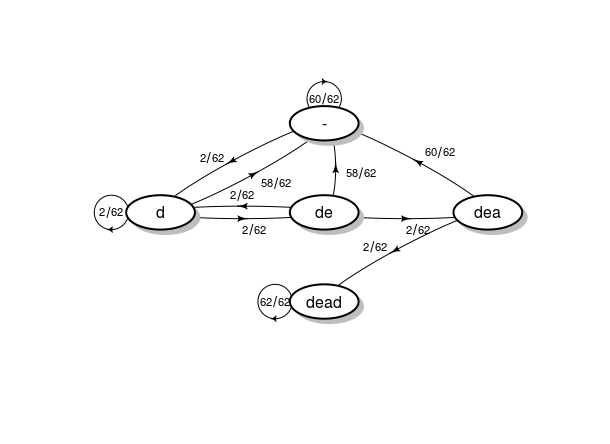This answer can be viewed as supplemental to @StephanKolassa's answer, in light of the counterexample provided in the comment by @whuber.
Although the accepted answer is not a general solution, it does work for the specific question asked by the OP. We will start with a sufficient condition for the formula to hold.
Let $L$ be the length of the largest string $\gamma$ such that $\alpha = \gamma\delta\gamma$, where $\delta$ is an arbitrary string. Let $\alpha$ and $\beta$ be strings of length $S$ and $M$ respectively.If $\beta$ is generated uniformly at random from an alphabet with $N$ distinct characters, then the probability that $\beta$ contains $\alpha$ is equal to $$\frac{M-S+1}{N^S}$$ so long as $S < M < 2S-L$
This extra condition $M < 2S - L$ is sufficient to ensure that no double counting of strings occurs. Without this condition, there is a potential for double counting, so that the formula becomes an upper bound on the actual probability. Note also that this condition rules out @whubers counterexample ($3 \nless 2\cdot 2 - 1)$.
Other examples
In the original example, if we increase $M$ from $7$ to $8$, the string DeadDead would be counted twice: once when we count all strings of the form Dead???? and again when we count strings like ????Dead.
To see the role of $L$ it is hepful to consider a new string of interest, say $\alpha = $onion, which has $L = 2$ ($\gamma =$ on, $\delta =$ i). Suppose for example that $M=8$, and consider the string
onionion. This will be double counted when we consider patterns onion??? and ???onion.
dead not Dead
What if the OP had asked for the probability that a $7$ character string contained the word dead rather than Dead. Now, the previously stated formula would not apply, because $7 \nless 2\cdot 4 - 1$. Thankfully, the answer is straightforward here, since we are over counting by just one. The probability becomes
$$\frac{4}{62^4} - \frac{1}{62^7},$$
which, of course, is practically indistinguishable from the previous answer.
As $M$ grows and becomes much larger than $2S - L$, the propensity for double counting will grow however, and the upper bound will become less tight.
Bonus
It is not too hard to come up with an English word having $L = 3$, for example ionization. Comment if you can come up with a common English word such that $L=4$!
Edit:
The bonus points go to @SextusEmpiricus who tracked down the English word sterraster! This word corresponds to $L=4$. Anybody want to try for $L=5$?
Edit (12/23):
@PhilipSwannell tracked down the English word undergrounder, a great example for $L=5$. He also came up with benzeneazobenzene, a cool $L=7$ word. But since benzeneazobenzene isn't a word on merriam-webster.com, I think I (personally) will consider undergrounder the current record.

